Overcoming addiction is a challenging journey, often fraught with numerous obstacles and setbacks. However, with advancements in technology, particularly in the field of artificial intelligence (AI), recovery programs are undergoing a revolutionary transformation. This article explores how AI is reshaping addiction recovery, providing insights into its mechanisms, benefits, and practical applications.
Introduction
Addiction is a complex condition that impacts millions of people globally. Traditional recovery programs have been essential in providing support and recovery mechanisms, but they often need to be accompanied by continuous innovation and improvement. AI has brought forth a new wave of change, presenting novel ways to support individuals on their recovery journeys.
AI and Addiction Recovery Programs
Personalized Treatment Plans
One of the most significant contributions of AI in addiction recovery is the development of personalized treatment plans. Through sophisticated algorithms, AI can analyze an individual’s unique circumstances, including their history, triggers, and behavioral patterns. This analysis helps in crafting highly tailored recovery strategies that increase the chances of successful outcomes. Personalized plans ensure that each person’s recovery path is as unique as they are, providing a more compassionate and effective approach to overcoming addiction.
Predictive Analytics
Predictive analytics is another powerful tool in AI’s arsenal. By analyzing patterns and data from various sources, AI can predict potential relapses before they occur. This proactive approach allows for timely interventions, preventing a slip from becoming a full-blown relapse. Predictive analytics can monitor behaviors such as changes in moods, social interactions, and even biometric data to forecast vulnerabilities and provide the necessary support when it is most needed.
AI-Driven Behavioral Therapy
Cognitive Behavioral Therapy (CBT) is one of the most effective methods in treating addiction. AI has enabled the development of digital CBT platforms that provide real-time support and guidance to individuals. These platforms use machine learning to adapt therapy sessions based on the user’s responses, ensuring that the therapy remains relevant and effective. They offer a supportive environment that’s accessible 24/7, making it easier for individuals to seek help when they need it most.
Virtual Companions and Support Systems
The isolation often experienced during addiction recovery can be a significant hurdle. AI-powered virtual companions provide an empathetic and non-judgmental presence, helping individuals feel supported throughout their journey. These virtual companions can engage in conversations, offer motivation, and even remind users of their goals and milestones. By creating a sense of continual support, these AI-driven systems can mitigate feelings of loneliness and provide a steady source of encouragement.
Data-Driven Insights
AI technology excels in handling large volumes of data. For recovery programs, this means an unprecedented ability to track progress and measure the effectiveness of different interventions. By collecting and analyzing data on various aspects of recovery, such as engagement with therapy, mood trends, and external factors, AI can provide insights that help refine and optimize treatment approaches. This data-driven method ensures that recovery programs can evolve in real-time, adapting to the needs of individuals as they progress.
Benefits of AI in Recovery Programs
Enhanced Accessibility
One of the standout benefits of AI in recovery programs is enhanced accessibility. AI technologies, such as mobile apps and online platforms, break down geographical barriers, allowing individuals to access support from anywhere in the world. This is particularly beneficial for those in remote areas or for individuals who may feel uncomfortable attending in-person sessions. The ease of access ensures that help is always within reach, promoting continuous engagement and support.
Cost-Effectiveness
The implementation of AI-driven recovery tools can also be a cost-effective approach. Traditional therapy sessions and rehabilitation programs can be expensive and may not be affordable for everyone. AI provides an affordable alternative by leveraging digital platforms and automated support systems. This democratization of access ensures that more people can benefit from effective recovery programs without financial strain.
Immediate Response
AI-powered tools can offer immediate responses to individuals in crisis. Chatbots and virtual support systems are available 24/7, providing instant assistance whenever it is needed. This immediate response capability can be crucial in moments of vulnerability, offering timely interventions that can prevent relapse or provide critical support.
Practical Tips for Integrating AI into Recovery Programs
While AI offers transformative potential, successful integration into recovery programs requires thoughtful implementation. Here are some practical tips:
- Customize AI Tools: Ensure the AI tools and platforms used are customizable to address the unique needs of each individual.
- Continuous Monitoring: Regularly monitor the effectiveness of AI interventions and gather feedback to make necessary adjustments.
- Combine Human Support: AI should complement, not replace, human therapists and support networks. Ensure that there is a balance between AI-driven and human support.
- Ethical Considerations: Adhere to ethical guidelines and ensure the privacy and confidentiality of individuals using AI tools.
- Training and Education: Provide training for therapists and support staff on how to effectively integrate and use AI tools in recovery programs.
Conclusion
AI is undoubtedly transforming recovery programs for overcoming addiction by providing personalized treatment plans, predictive analytics, and continuous support. Its ability to enhance accessibility, offer cost-effective solutions, and provide immediate responses makes it a valuable tool in modern addiction recovery approaches. As with any technology, thoughtful and ethical implementation is crucial to harness its full potential. By integrating AI with traditional methods, we can create a more holistic, compassionate, and effective approach to overcoming addiction.
With these advancements, recovery becomes more accessible and supportive, providing individuals the best possible chance to thrive and lead fulfilling lives.
If you are looking to track your progress, monitor mood trends, or set and achieve recovery goals, the Zenora app offers a suite of features designed to support you on your journey. From personalized goal-setting to insightful mood tracking, Zenora can be an invaluable companion in your recovery process.





